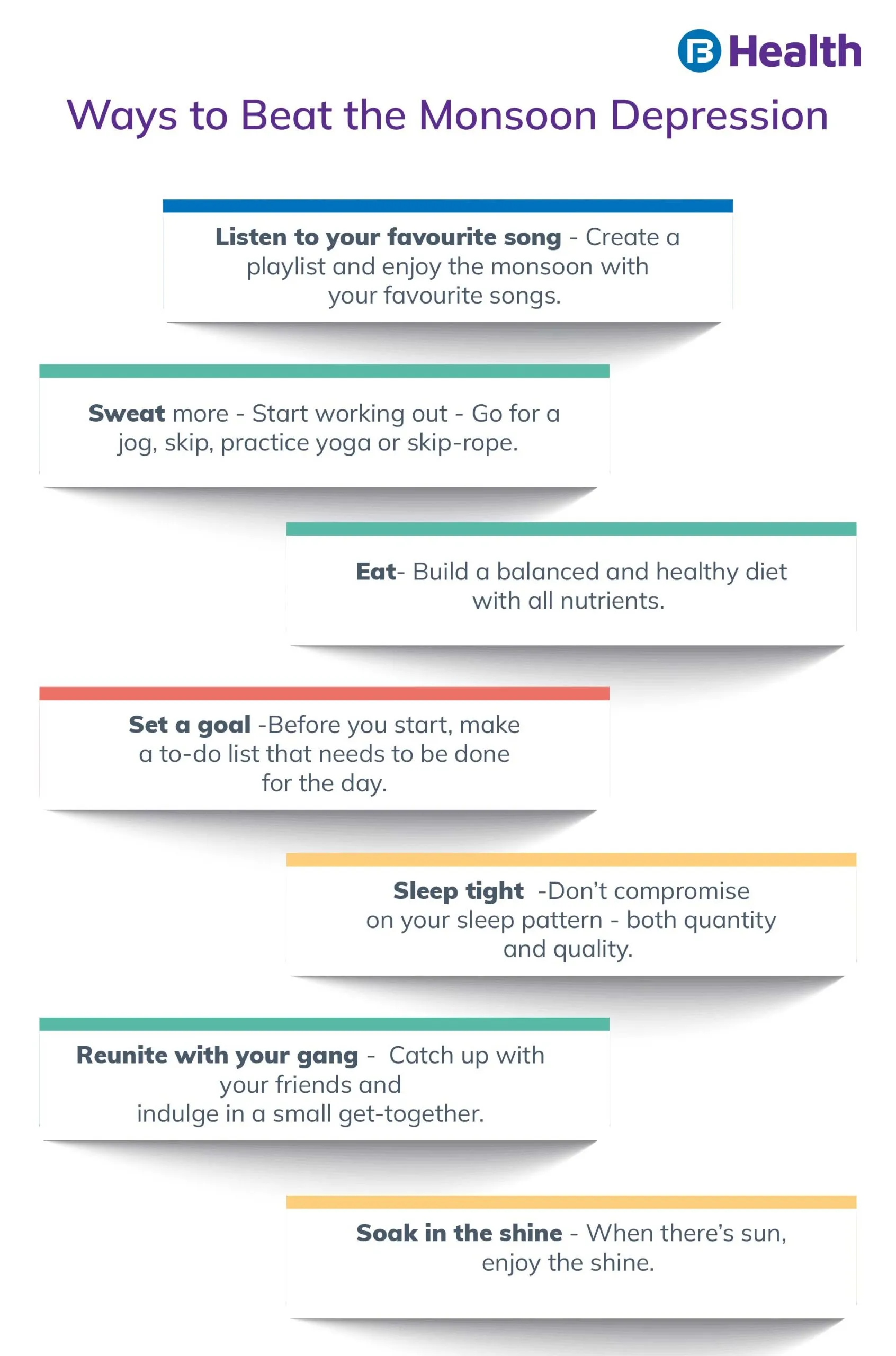Psychiatrist | 4 min read
Monsoon Depression: Causes, Ways to Beat and Tips
Medically reviewed by
Table of Content
Synopsis
Feeling depressed and lethargic, especially during the winter, might be due to monsoon depression. This is brought out by the Seasonal Affective Disorder (SAD) syndrome. Therapy is an effective treatment option to instill positive thoughts in the individual.
Key Takeaways
- Monsoon depression, a SAD syndrome, will give you sudden mood swings and transform your behavior into a dull version
- The symptoms occur during the darker and shorter winter and fall days
- Light therapy and psychotherapy can help to relieve the symptoms
Are the short, dark days of winter making you feel depressed? Do you often feel like the raindrops expressing your unshed tears? Then you might be stricken by the monsoon depression. Monsoon is one of the sought-after seasons, as it brings cool relief following a scorching summer heat. However, like every season, it also brings challenges and health issues, including monsoon depression.
What is Monsoon Depression?
Monsoon depression refers to the irritation and dampening of one's spirit due to the incessant rains. The condition belongs to Seasonal Affective Disorder (SAD), a type of depression that arises mostly during the rainy or winter season.
Monsoon depression is common in most people but might worsen in a few, depending on their behavior patterns. It occurs due to the lack of sunlight exposure and is seen in people closer to the poles than the equator.
Additional Read: Seasonal Affective DisorderHow does Monsoon Depression affect Your Health?
Your body undergoes severe chemical changes when it is not exposed due to an adequate level of sunlight. It will affect your body's Vitamin D, serotonin, and melatonin levels. This will, in turn, disrupt the biological clock, compromising the quality of your sleep pattern. The condition is accompanied by consistent low mood, strong guilt, loss of interest in daily activities, difficulty in concentrating, overeating or poor dietary habits, and more.
Similar to other forms of depression, monsoon depressional also contributes to potential health hazards, both physically and mentally. Hence, ensure to get a doctor's consultation for an accurate diagnosis to manage your emotional wellness.

Causes of Monsoon Depression
The exact causes of Monsoon depressions are unclear. Most theories attribute it to the decreased day hours, shorter days, and reduced exposure to sunlight during the winter season. Here are some possible monsoon depression causes that include:
1. Effects of Light
When the eyes witness the light, it will send a message to the brain that controls sleep, appetite, temperature, mood, and activity. If the eye cannot observe a sufficient amount of light, these functions will be slowed down by the brain and eventually stop at one point, making you feel depressed.
2. Circadian Rhythms
Your sleep-wake cycle, or the body's internal clock, tends to respond to the changes between light and dark. This is known as circadian rhythms and aids in regulating sleep, mood, and appetite. The shorter daytime and longer nighttime can disrupt the rhyme, making you feel sleepy and disoriented at all times.

3. Melatonin Secretion
During the dark time, your brain secretes the melatonin hormone, which includes sleep. However, in the daytime, the sunlight triggers the brain to cease the production of melatonin so that you can awake and feel alert. The reduced daylight and long winter nights enable your body to produce a high level of melatonin, making you feel tired with low energy.
4. Production of Serotonin
Serotonin is a neuro-transmitting hormone that aids in the regulation of mood. Just like melatonin, the reduced sunlight during winter can decrease the secretion of serotonin. The deficit will result in monsoon depression by adversely affecting the quality of your sleep, memory, and appetite.
5. Weather and Temperatures
We all have different experiences and responses to specific seasons and types of weather. You might feel uncomfortable either in the hotter or winter season, which contributes to depression. However, more such effects are happening in the winter resulting in monsoon depression.
Additional Read: Mindfulness TechniquesSimple Tips to Beat the Monsoon Depression
As the world is already fixing a global health crisis, it is important to take care of our mental and physical health even more, to stay fit and healthy. Here we have compiled the best monsoon health tips to overcome the challenges:
- Create an artificial set-up in your home with enough light.
- Enhance your physical activity.
- Practice yoga or meditation.
- Go for a long walk.
- Consume a balanced and nutritious diet.
- Brighten yourself up to uplift your mood.
- Spend time with family and friends.
Suppose none of these mindfulness techniques helps you to decrease the intensity of the condition rather than causing you to shut yourself out completely. In that case, it's time to seek professional help from a psychiatrist.
The infamous rainy season does not always spell relaxation. While many clicks the perfect rainy picture from their balcony, others cannot stand the sound due to the monsoon depression. However, following a regular and disciplined sleep cycle, a healthy diet, and physical activity will cheer you up and help you lead an active life through the season! Let yourself revel and rejoice in the relief of this rainy season!
References
Disclaimer
Please note that this article is solely meant for informational purposes and Bajaj Finserv Health Limited (“BFHL”) does not shoulder any responsibility of the views/advice/information expressed/given by the writer/reviewer/originator. This article should not be considered as a substitute for any medical advice, diagnosis or treatment. Always consult with your trusted physician/qualified healthcare professional to evaluate your medical condition. The above article has been reviewed by a qualified doctor and BFHL is not responsible for any damages for any information or services provided by any third party.



